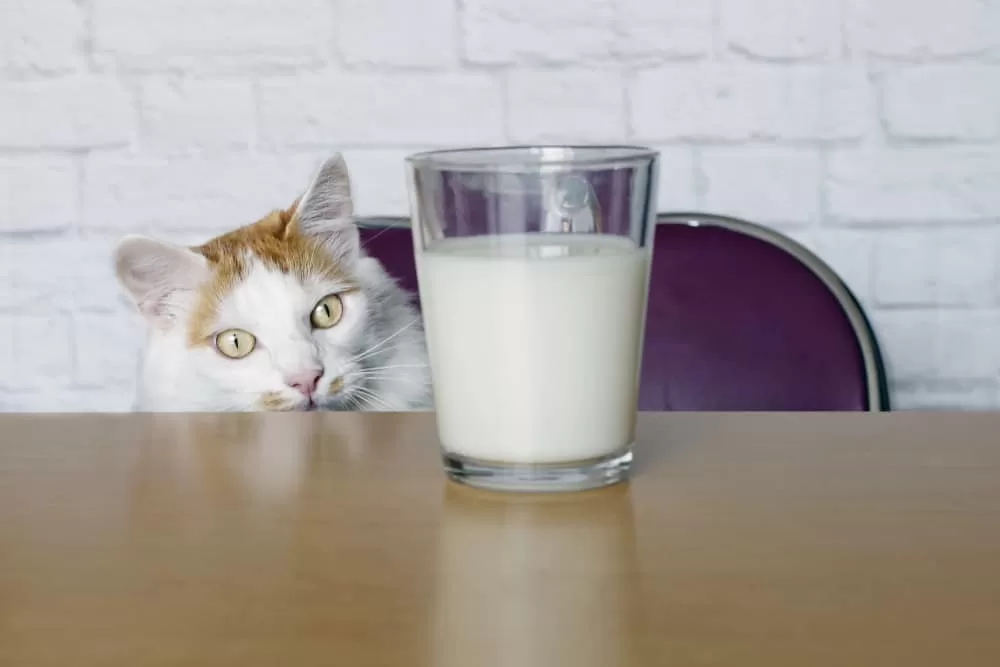Types Of Dog Brushes
Grooming your dog regularly helps minimize shedding, control where that loose hair falls, and improve the health of your dog’s

Table of Contents
Cats can not–and should not–drink milk. However, this answer is not as cut-and-dry as it seems. The fundamental issue comes from the actual chemicals in the milk itself.
We humans primarily drink milk from cows, goats, nuts, and soybeans. Cats, on the other hand, drink milk from their mothers when they are kittens. Their bodies are built to consume that exact composition of milk–any other kind can cause them diarrhea, vomiting, or possibly excess shedding because the enzymes in their stomachs cannot properly digest the high lactose levels. This is especially true of adult and elderly cats.
Can kittens drink milk? For most kittens, the answer is a firm ‘no’. Although their stomachs contain intestinal lactase–the necessary enzyme for digesting lactose–the amount of lactose in cows’ milk is significantly higher than that of cat milk. But what do you feed a newborn kitten without a mother?
When a kitten is separated from its mother before it is ready to eat cat food, the best thing to feed them is a kitten milk replacement. They are usually mixed with water and fed via a bottle, though some can be used as-is.
These special powder or liquid formulas are designed specifically to provide young cats with nutrition that is as close to cats’ milk as possible and should not cause adverse reactions. Once the kitten is five weeks old, it should be weaned and begin eating solid cat food.
As always, consult with your veterinarian if you have any questions or concerns. Your local animal shelter can also provide you with more information.
As kittens grow into adult cats, the contents of their intestines change. That necessary lactase enzyme decreases dramatically, to the point where many grown cats actually become lactose intolerant.
Every cat is different, and some cats can still handle a few spoonfuls of milk, but there truly are no health benefits to having a cat drink cow or goat milk. If you really have your heart set on giving your cat milk, consider specialized cat milk as an alternative. It resembles kitten formula in many ways and contains some healthy vitamins for your kitty, such as taurine.
However, this “food” contains added calories and can NOT be used as a substitute for water. Many domestic cats struggle with obesity and kidney-related diseases: keeping your cat’s calories down and their water consumption high is key.
Consider cat milk as a special treat, and make sure your cat has clean, fresh water throughout the day. Additionally, adding wet food to your cat’s diet can be an effective way to increase their water intake.
Can cats drink almond milk or lactose-free milk? What kind of milk can cats drink? There are a few options that are safer for your cat to drink than cow or goat milk. Milk products that are specially formulated for cats (often called cat milk) can be found at most pet stores in both liquid and powder form, and kitten milk is appropriate for kittens under five weeks old.
In terms of alternative milk products, almond milk is a decent option. It does not contain lactose and contains a large amount of vitamin E. As long as it is consumed in moderation–and does not consume artificial sweeteners, flavorings, or preservatives–almond milk is a safe treatment for most cats. The same is true of coconut, soy, oat, or rice milk.
Finally, goat, sheep, and lactose-free cow’s milk can be safer for your cat than regular cow’s milk. Goat and sheep milk contains a much lower level of lactose than cow milk, though it can still cause your cat an upset stomach. Additionally, lactose-free cow’s milk is a good option for cats who are especially sensitive to lactose.
A word of caution about milk alternatives: cats should NOT consume condensed milk, cream, or whipped cream. These options are much higher in fat and sugar than regular milk and are too rich and heavy for cats to digest properly.
As tempting as it can be to share a glass of milk with your cat, there are little-to-no health benefits in doing so. The best liquid for a cat to drink is water. Alternative milk products can make for a nice treat for your kitty, but the healthiest diet for a cat is their regular dry cat food, wet food to help increase hydration, and plenty of water. When in doubt, contact your veterinarian with any questions you have regarding your cat’s diet.
 Ashley
Ashley
Grooming your dog regularly helps minimize shedding, control where that loose hair falls, and improve the health of your dog’s
Have you begun to notice a little more cat fur around the home than you are used to? Most cat
A slicker brush is one of the most essential tools in your dog grooming arsenal. This product can do it
TO GET 15% OFF ON ALL YOUR PURCHASES